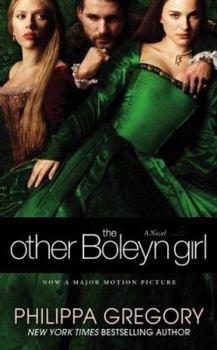When I was finishing college, a movie based on a book came out starring The Hulk, Thor's girlfriend, and Black Widow in Tudor England. I ask you, what about that statement is not extraordinary?
It's true, of these three Marvel wonders, only Hulk (2003) had actually come out by the time this film adaptation of The Other Boleyn Girl (2008) was released. But the book, which is what we're here to discuss today, was published in 2001, prior to any of these box office releases.
European history has always held a sort of fascination for me. I remember learning of Henry VIII and the rhyme involving his six wives when I was in 7th grade social studies class: "divorced, beheaded, died, divorced, beheaded, survived". Any asshole who straight up murders his family and changes a nation's history, religion, and politics to better suit his sex life is a narcissist who leaves a mark on your brain. Anyway, I started this whole pointless anecdote with my being in college...I saw a friend of mine on campus one day reading this book, and I found that I was jealous. With my areas of study (French, English, Art History), my reading time was swallowed up by required texts for an array of classes. (Side note: the French lit that was mandated was ALWAYS BORING AND WEIRD AF.) By the time I'd finish one book and write a subsequent paper on it, it was time for another. Reading for pleasure was a rare treat until a semester ended.
Fast forward about 16 years and here I am! I finally read this book and, may I say, it would have been better if the Hulk had actually been in it.
Even this Hulk...
To be truthful, the book wasn't bad. It sparked my curiosity about a number of things, so I found myself doing quite a bit of fact checking. Of course, it is a work of fiction and claims to be nothing else, but it does leave me frustrated when historical fiction authors deviate a great deal from accepted truth about a time, place, or person. (Example: Mary Boleyn being banished from court for a clandestine marriage was true. Contrary to the book, however, I believe she was disowned by her family and never allowed to return to court. Also never mentioned in the novel: Anne did eventually try to make some financial provisions for her sister.) Although it was an engrossing diversion, it did make me feel sad and disgusted by the time, place, and just about every person.
For instance...
Henry VIII - I don't feel like I need to say much about why this guy was awful. Narcissistic, self-involved, and just straight up gross. He thought he was sly in the way that children think that if they cover their eyes, they become invisible. He couldn't keep his pants on and murdered people who didn't suit his baser desires. Plus he liked hunting and bear-baiting, so clearly a sociopath.
Boleyn and Howard families - There is nothing wrong with being ambitious, so long as one's ambitions are in check with reality. The Boleyn and Howard families (Howard being Mary and Anne's maternal family surname) thought nothing of sacrificing their daughters' well-being -and LIVES- for their own monetary and social gain. You'd think they would have learned from the executions of Anne and George (two out of three of their CHILDREN!!!) that ambition in the Tudor court is a dangerous game, but they did not. In fact, it was Catherine Howard (a relative of Anne's) who was the other "beheaded" of Henry's gruesome lineup of wives. Seems that the Boleyns and Howards have a theme. Were they apologetic? It wouldn't appear so...
Mary Boleyn - It's easy to judge through a modern lens, but she just seems whiny and pathetic - at least in the book. Still, if the novel is based on any measure of fact, her abuse and/or neglect began at a young age, and people do weird things when subjected to cruelty and childhood marriage. The ultimate reality of Mary Boleyn's life is just that it was sad.
Anne Boleyn - According to the novel, she was a total bitch. I wonder if any of this portrayal is accurate. Maybe so. History certainly considers her cunning and willing to angle, but I'm curious to what extent she abused her relationship with Mary in real life. For example, quick research will reveal that Anne did not steal-adopt Mary's son from her (naughty), rather provided for his education as her ward (nice). There's a difference. I'm unable to tell if Anne ever used Mary's children as pawns in her schemes, but there doesn't seem to be any real evidence of that happening.
Catherine of Aragon - Good lord, what a sad situation. Catherine of Aragon -Henry's first wife- appears to have done nothing to merit her treatment and ousting...beyond getting older, of course. (For shame!!!) The number of children she lost to miscarriage or stillbirth is heartbreaking, and certainly not her fault, but she appears to have borne the blame. God knows what actually went on inside her head but, a devoutly religious person, to have been forced into a divorce would have upset her fervent Catholic beliefs. Furthermore, to be denied access to her one living child (Princess Mary) is nothing short of cruel. On top of that, Catherine was a lifelong royal. Before becoming Queen of England, she was Princess of Spain (her parents being the Ferdinand and Isabella who funded Christopher Columbus's 1492 voyage). For her to be ousted was, more or less, a double blow.
Princess Mary - Oh, Bloody Mary. Honestly, her fall from favor makes her later "bloodiness" almost understandable. As Henry's first legitimate child, she was raised as a princess. Although her parents were mostly absent from her upbringing (typical of the time), she would likely have enjoyed their affections from afar. Well educated, provided for, and visited from time to time, she was a standard English princess. Of course, once Anne Boleyn entered the picture, everything changed. She was cast off, forced to wait on her -arguably illegitimate- stepmother (Anne) and half-sister (Elizabeth). Not only would this blow to her pride and position have humiliated her, she was then denied visitation to her one remaining ally: her own mother. Poor Mary was even forbidden to attend her mother's funeral. So yeah, she went a little scorched earth during her own reign as Queen of England. Should she have been so cruel to English non-Catholics? Certainly not. But perhaps it was one way she felt she could exert control, and a return to her mother's staunch morals and memory.
While the novel The Other Boleyn Girl certainly does highlight each of these characters and their individual stories, it does deviate somewhat from the truth. Of course, as historical fiction, this is to be somewhat expected. I do feel that it does well to embody the spirit of the time and characters mentioned, if not in a wholly accurate portrayal. We can only speculate as to who these people were beneath the bravado, but the fall from grace experienced by each one is nothing less than tragic and unnecessary.
A final note: It is so easy to miss the human nature of historical figures. After all, they are typically reduced to dates, facts, and a few accomplishments or failures. Even their portraits -that really don't resemble us today- appear cold, distant, and unrelatable. Catherine of Aragon and Anne of Boleyn were both considered beauties in their time, but paintings of them leave us (me) questioning the beauty standards of the day. Until I came upon this...
A present-day artist took the portraits of each of Henry VIII's wives and made modern re-creations of them using AI. The results are stunning and, to me, made me reconsider not only the beauty of these six women, but their humanity. Somehow, seeing Anne of Cleves with a full smile or Catherine of Aragon in a Nike sports bra makes them seem like people I might know.
Six Wives of Henry VIII: Modern Recreation






